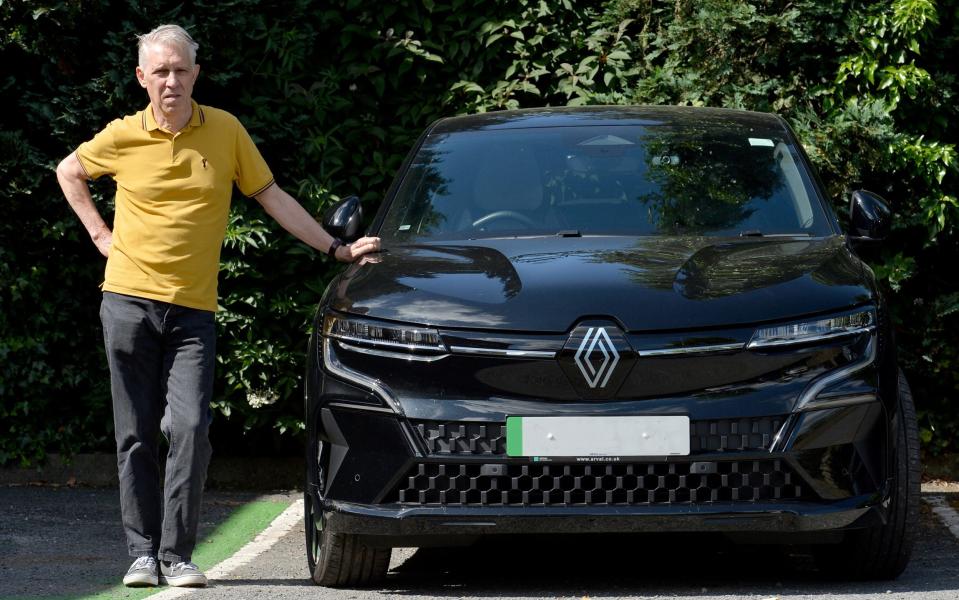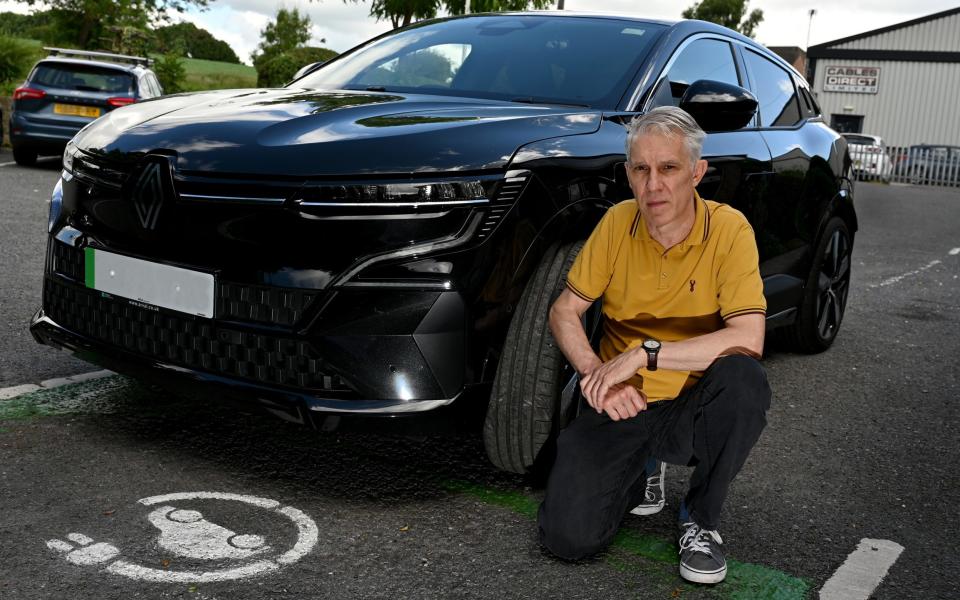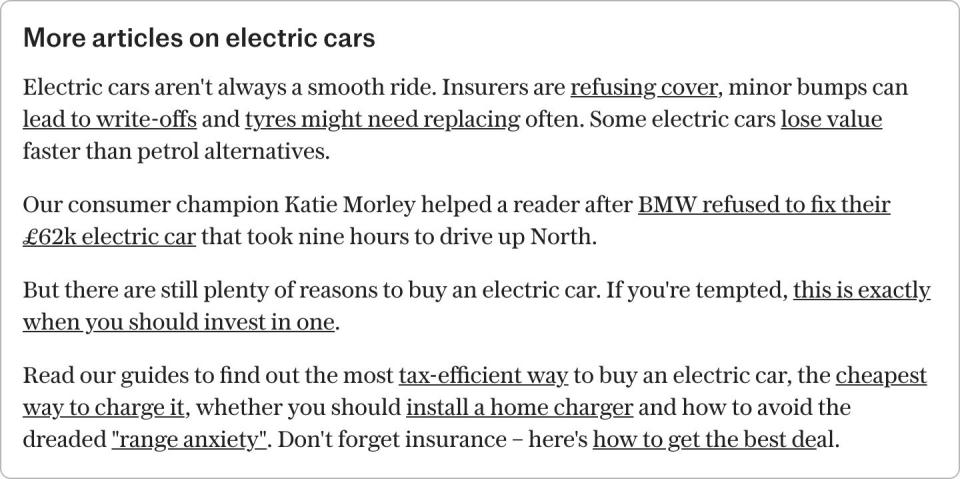‘I’m not going to buy electric again – it’s the worst car I’ve ever had’

Ray Bestwick bought an electric car last May in the hope of hassle-free motoring.
But with eight trips to the garage in little more than a year, the 62-year-old engineer cannot wait to put an end to his “soul-destroying” experience.
The Renault Megane E-Tech driver isn’t the only electric vehicle owner to face a multitude of problems, with a host of Telegraph readers detailing their reasons for pulling the plug on green energy.
Fears over range and a lack of charging infrastructure are the main factors behind owners turning their back on EVs.
Mr Bestwick, from Derbyshire, said: “My Renault is meant to have a range of 280 miles but it’s only ever reached over 200 twice out of about 30 times. I’m lucky to get 160 out of it, so it’s blatantly obvious there is a problem.
“I’ve taken it to three different Renault garages and they’ve all said there’s nothing wrong and it’s because of my driving style.
“I don’t agree with that at all – I’m 62 years old and drive in eco mode 90pc of the time. I’m after economy, not speed.
“It’s soul-destroying constantly getting told it’s my fault when it clearly isn’t.”
A recent investigation by What Car magazine found that electric cars have up to a third less range in reality than advertised. The data highlighted the disparity between the results of official government tests and those that can be achieved during real-world usage.
“I’m at the end of the line as it’s ridiculous,” Mr Bestwick said. “I’ve considered not paying the monthly lease but I don’t want any trouble so I’m waiting until next May when I can ditch it.
“I’m so glad I didn’t purchase the car outright. It would have cost £38,000 then, but the values depreciate so quickly I think it would only be worth about £22,000 now.”
Research from Auto Trader earlier this year found that a motorist buying a £50,000 electric car could expect to lose £24,000 in value over three years, while a similarly priced petrol car would lose only £17,000.
“I’m all for technology but I’m going back to petrol, or I’ll get a hybrid. I’m not going to entertain full electric again as this has been the worst car I’ve ever had,” Mr Bestwick said.
Renault told The Telegraph it is “sorry” to hear of Mr Bestwick’s concerns, but reiterated that a lack of range is likely down to driving style.
A spokesman said: “Investigations by our dealers suggest the range indicated is commensurate with Mr Bestwick’s driving style and car set-up.
“As with all cars, no matter if they are combustion engine or electric, driving style, environmental conditions and car set-up are significant contributors to achieve range in real-world driving.
Renault said techniques such as “making use of regenerative braking systems, moderating speed and the use of the heating or air-con” will help boost range.
The manufacturer also said some E-Tech owners have reported surpassing the advertised 280-mile range.

However, for Nigel Pullen, who owns an electric Skoda Enyaq, manufacturers will need to almost double range capabilities before British drivers welcome EVs with open arms.
“Until EVs have a genuine range of 500+ plus miles, there will be a constant issue,” he said.
“My wife drives an electric Skoda and for local use, it’s fine but for the longer journeys, forget it.
“We’re in Cornwall and our son lives in Derbyshire so we thought with a 330-mile range, we’d be able to get there. But the reality is totally different.
“We can get about 250 from it, but even then, your eyes are constantly on the range.
“We’re going to dump it when the lease is up and have a petrol-hybrid instead.”
Data from the Society of Motor Manufacturers and Traders (SMMT) shows that EV uptake is being sustained by growing demand from the fleet market, as a result of businesses offering employee benefits such as salary sacrifice to take on an electric car.
Demand from the general public is falling flat, yet Labour plans to toughen up the UK approach to EVs, forcing more people to make the switch to battery power.
The party is poised to bring forward a ban on the sale of new petrol cars from 2035 to 2030, undoing a delay announced by the Conservatives.
What readers are saying
Last week, The Telegraph reported that only 30pc of EV owners who part-exchange their car buy another electric motor – with the rest opting for either petrol, diesel or hybrid models.
Telegraph readers flooded the comments section in reaction to the data, with many highlighting their troubles with battery power.
However, some are steadfast in their view that electric is the way to go and have spoken highly of their driving experience.
‘Britain doesn’t have the infrastructure’
Reader Jane Gregory is a Tesla 3 owner who intends to trade it in at the end of the year for either a petrol or hybrid model because of range anxiety: “We cannot go on any long journey without having to add time and inconvenience. It really is such a faff to charge your car anywhere else but home.
“Sometimes the charging points don’t work or there is a queue, etc. Britain does not have the infrastructure, but even if we did, can you imagine the queues everywhere to charge? Sorry Tesla, I do love you but it’ll be a goodbye.”
‘No wonder demand is collapsing’
Cliff Nicholls argues that for mass adoption of EVs to take place, a hugely intricate and costly infrastructure upgrade is required: “Few really understand the complexities involved with rolling out a charging infrastructure.
“Fast chargers draw huge currents, which need very thick cables, high voltage transmission upgrades and even to get home chargers at every house will need massive grid upgrades.”
In a similar vein, reader Chris Chambers criticises a lack of investment by the Government: “They created an artificial market by giving ridiculous incentives that the taxpayer couldn’t afford. Now the incentives are being diluted, as they always had to be, and combined with the underinvestment in infrastructure it is no surprise to me that demand is collapsing.”
‘Charging my EV is very cheap’
Gareth Probert, a proud Tesla owner is happy with the affordability: “I don’t recognise any of the complaints about range anxiety or costs to run. The Tesla Supercharger network is fast, well developed and I charge overnight at home for 7.5p/kw hr – very cheap!”
Reader Eric Moore said a great benefit for EV owners is that they are immune to fuel shortages: “I remember sailing past the long lines of cars waiting for fuel in Cambridge. I felt sorry that that happened. But it shows you that petrol is vulnerable to events.”
However, for reader Neal Preshner, the cost is too much: “The question that needs to be asked here is, why are people being ripped off for electric charging away from their homes? If domestic suppliers are charging roughly 20p per unit why is a typical petrol station charging 75p?
“Having had a plug-in hybrid on loan for a few weeks, and buying a 50-mile charge at the medium rate of 50p a unit, I calculated the car would have done the same mileage on £12 of petrol.”
‘Imports from China mean they aren’t very green’
One of the most promoted benefits of using EVs is their positive impact on the environment, due to less consumption of fossil fuels and a reduction of local pollution.
But reader Rupert E Beehsley questions their overall green credentials: “Nobody with a brain buys an EV while the technology is rapidly developing and leading to massive depreciation on older models. Range decreases with age and batteries are exorbitant to replace.
“Soon, the only affordable EVs will be Chinese, made with coal-powered electricity generation and shipped halfway round the world. Very green eh?”
On the other hand, reader Barbara Manick denies the accusations of self-righteousness usually thrown at EV drivers: “EV owners have no halo to polish. Their cars simply don’t chuck out hideous gases into the atmosphere and they are a pleasure to drive.”


 Yahoo Finanza
Yahoo Finanza 